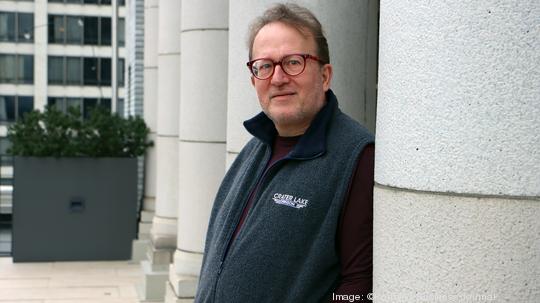
Steroids such as cortisone and prednisone are widely used to reduce inflammation and treat various autoimmune diseases, but they can also produce severe side effects.
Excessive amounts of corticosteroids can lead to memory, mood and sleep problems, as well as fractures, diabetes, stroke and glaucoma.
A Portland biotech startup called Sparrow Pharmaceuticals is developing novel therapies that target toxic cortisol levels either from medications or natural overproduction in the body. The idea is to separate the therapeutic properties of steroids from their harmful side effects.
The potential market is vast. About 2 million patients in the U.S. are on corticosteroids.
Sparrow took a giant leap forward last year, when it closed a $50 million financing round and hired a new CEO, Robert Jacks. It has three separate Phase-2 clinical trials in the works. And it has a bit of a head start, as large pharmaceutical companies have already done some of the basic science work.
“As far as industry goes, they’re very de-risked for compounds at this stage,” Jacks said. “The potential upside is attractive.”
The science
Active steroids within cells are predominantly regulated by an enzyme called HSD-1. With normal levels of cortisol in the body, HSD-1 has a role in the regulation of various physiological processes.
Sparrow is developing what it touts as “highly potent and selective HSD-1 inhibitor” to lower active steroid levels in key tissues and mitigate their toxicity. Its lead drug candidate is entering phase 2 clinical trials as an oral, therapeutic treatment for reducing excess intracellular cortisol and adverse effects.
The therapy is being targeted to treat Cushing’s syndrome, a rare endocrine disorder of severe cortisol excess, and another disorder resulting from moderate cortisol excess.
Sparrow is also developing a combination therapy with the corticosteroid prednisone to see if it will produce fewer side effects but not diminish the medication’s efficacy. Jacks believes this could “revolutionize treatment of autoimmune disease.”
Smaller and nimbler
The idea for using the HSD-1 inhibitor in this way is the brainchild of David Katz, who serves as chief scientific officer. Katz had helped lead R&D at Abbott Laboratories and AbbVie before founding Sparrow in 2013.
“I woke up one morning right after I had turned 50 and realized I have learned a lot, but I’ve plateaued on what I’m learning here and my general personality is more suited to a smaller, nimbler organization,” Katz said.
Big pharma often struggles to finance early-stage development opportunities, because the programs have “no visibility and value to real constituents, their investors, so it’s hard to keep justifying spending money on them,” Katz said.
“A lot of good science gets done, but it’s not their core competency,” he said.
The compounds he eventually licensed from Astellas Pharma had solid clinical and scientific potential but had been de-prioritized for business reasons.
Katz had worked on the enzyme inhibitor while leading a clinical trials team for Alzheimer’s and dementia.
“So I already had a lot of expertise in the mechanism and had ideas about what could be done that would work with those drugs,” Katz said.
Or as Jacks put it: “The hypothesis for the company is that this mechanism might be one that a lot of potential hasn’t been explored because the compounds were mis-targeted toward indications for which the mechanism wasn’t best suited.”
In 2018, Katz moved to Portland, drawn by the pinot noir. He also became an entrepreneur-in-residence at OHSU, helping faculty members translate their basic science into marketable therapies.
In 2019, Sparrow won the Oregon Bioscience Association’s Pitch Fest. Jacks came on board in the summer of 2020 at the request of one of Sparrow’s lead investors, OrbiMed, and worked with Katz on a $50 million Series A financing that was in progress. He lives in Connecticut, while other employees are spread out around the country.
The funding round will enable the company to “rigorously test the hypothesis that this mechanism of which the compound is the best in class can have an impact on conditions where it is better suited than where it has been tried before,” Jacks said. He hopes to have data from three clinical trials at the end of 2023.
The company has another key funding source to draw on as well. In December, Sparrow opened a $20 million line of credit with Silicon Valley Bank.
“That gives us flexibility, Jacks said.
SPARROW PHARMACEUTICALS
What: biotech startup dedicated to “sparing patients the ravages of steroids”
CEO: Robert Jacks
Founded: 2013, by David Katz
Revenue: none yet
Headquarters: Virtual, though Katz lives in Portland
Employees: 8
TIMELINE
2013: Founded by David Katz
2018: Licensing agreement, Katz moves to Portland
2019: Wins Oregon Bioscience Association’s Pitch Fest
2021: Closes on $50 million funding round, names Jacks CEO



